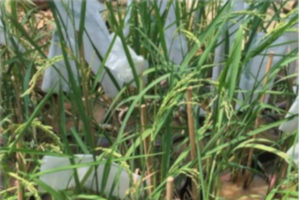Resistance to root knot nematodes in rice

Asia is the main rice-growing region of the world and is responsible for about 90% of global rice production. Rice is the staple food for more than 50% of the population in Asia, a figure that can reach up to 70% for Southern regions of this continent including least developed countries such as Vietnam and Cambodia. Prof. John Jones in the School of Biology and colleagues from the James Hutton Institute are working on the development of rice cultivars resistant to the rice root-knot nematode, Meloidogyne graminicola, a damaging pathogen which is increasing in prevalence and importance due to climate change and evolution of agricultural practices. Along with researchers from France and Vietnam, they are working to identify informative sequence differences that will be used to develop markers that are genetically associated with nematode resistance. Markers generated in this project will be fed into Vietnamese rice breeding programmes to ensure that the developed cultivars are relevant in a local context to promote economic development for the local growers by decreasing the yield losses caused by the pathogenic nematode and by decreasing pest control costs.